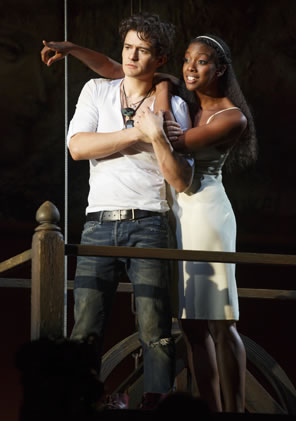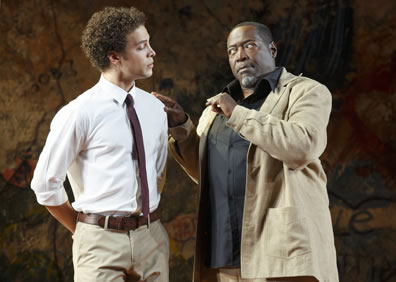Romeo and Juliet
Oh Romeo! Wherefore Art Thou Romeo?
Richard Rodgers Theatre, New York, N.Y.
Saturday, November 2, 2013, D–105&106 (center stalls)
Directed by David Leveaux

Orlando Bloom as Romeo and Condola Rashad as Juliet. Photo courtesy of The Hartman Group.
For us Shakesgeeks, it is both an opportunity and validation that so much Shakespeare is playing on Broadway and its adjoining New York theatrical districts right now: This production is the first of six that Shakespeareances.com will review this month. Notably, this production of William Shakespeare's Romeo and Juliet hits the Great White Way not as a transfer from a hard-core Shakespeare institution nor as some Way-Off-Broadway production caught fire, but as a homegrown product in the great Broadway theater tradition: attach a big star to a sure-fire popular title, team him with an actress sporting impeccable stage cred, apply some edgy production value, and charge top dollar (up to $240 per, cheap seats for just under $100).
Many in the audience who sprang for those pricey seats appreciated their purchase, some even bestowing a standing ovation at the end. But those of us who have seen benchmark Shakespeare performances wish for more Bard power than star power. From the very start, this production has all the expertise and insight of middle school Shakespeare.
Director David Leveaux has only one Shakespeare entry in his bio, but it is a significant one: Romeo and Juliet at the Royal Shakespeare Company in 1991. Nevertheless, the overriding impression of this production is that Leveaux has only done a cursory reading of the play without delving into the lines and characters, and that the cast, for the most part, doesn't seem to comprehend the verse they are speaking. That may be due to the trims in the text, which gets the play down to a 2:35 running time but leaves behind nonsensical speeches and characters speaking hollow words.
Leveaux seems more interested in look and texture than character and text. The modern dress production starts with a burst of noise and darkness, then a single light shines on a large bell hanging over the stage and a white dove flies out to it. Our attention is arrested, but Friar Laurence soon loses us with his tepid delivery as Chorus. A stone wall in large pieces occasionally serves as a backdrop, its faded fresco covered in love-heart graffiti, but otherwise the stage is bare other than that bell and some sand off to either side and rear stage serving no thematic and little practical purpose. Large rusty pipes, horizontal and vertical, occasionally appear and spout fire, and the soundtrack explodes from a large drum set (David Van Tieghem) and a cello (Tahirah Whittington), but in context of the play, it's all fury and sound signifying nothing. Costume designer Fabio Toblini provides a GQ look for Romeo and his buddies with leather jackets and torn jeans, the women are dressed in chic simplicity, and Laurence looks more pop guru than priest, yet there is no unifying thread saying either "This is fair Verona" or "These are two households alike in dignity." The Montagues are white, and the Capulets are black. However, race seems to have no factor in their rivalry, not even as a subtext.
The fights are fast and furious, but I swear that Tybalt (Corey Hawkins) and Mercutio (Christian Camargo) slash each other a dozen times before Mercutio receives his actual scratch. Perhaps it was a bad day, but Tybalt (as opposed to Hawkins) seems to be having a lot of those: In the opening fight, Benvolio (Conrad Kemp) easily counters Tybalt's attack—so much for the reputed skills of the Capulet prince of cats that Mercutio later describes.
That's just one of many disconnects between Shakespeare's text and the production. A glaring one comes at the Capulet party, where the women engage in some strange tribal-type dances (maybe I'm not going to the right chic clubs), and in all the hubbub, Juliet is hopping around with a balloon. She ends up back in the crowd, upstage right, when Romeo, downstage left, delivers his great love-at-first-sight line to Benvolio (rather than a serving man): "What lady is that, which doth enrich the hand of yonder knight?" Benvolio, dancing with a woman, doesn't care (cue laugh), but he also indicates he has no idea who Romeo is referring to; and, frankly, neither do we, even though we already know who Juliet is and most of us know they are supposed to meet at this party. "O, she doth teach the torches to burn bright!" No torches here, not physically (not even pipes of fire), and not emotionally, either, for there is no kinetic glow linking these two lovers at this moment.
This is a foreboding far greater than that of Romeo's dreams, for this particular Romeo and Juliet lack chemistry. It's missing in their first meeting (they don't seem aware they are speaking a sonnet, so laborious is the dialogue), in their balcony scene (Romeo seems to regard Juliet as an afterthought to his lines), and in the lark vs. nightingale discourse after their wedding night (Romeo, frankly, has real concern that the balcony seems a bit wobbly after colliding with the bell as it lowers from the flies).
Prince Escalus, notably, is at the party, though he's not on the guest list. Another extra-textual presence later in the play is Nurse (Jayne Houdyshell) entering early to overhear the latter part of Juliet's "Love's heralds" soliloquy about her tardy return from meeting with Romeo—"Had she affections and warm youthful blood, she would be as swift in motion as a ball." Hearing this, Nurse turns her own "I am aweary," shtick into a cynical comeuppance.
A final extra-textual presence comes at the end where Lady Montague (Tracy Sallows) is alive and accompanying Lord Montague (Michael Rudko) to the tomb. Frankly, I consider her off-stage death to be nothing more than Shakespeare conveniently dispensing with her because the actor playing Lady Montague was already on stage as Friar Laurence (my theory), so I'm fine with any director choosing to bypass that awkward insertion of her death and bring her on stage for the end. However, Leveaux gives her presence in this closing scene a tad too much significance, for even as Montague and Capulet are genuinely reconciling over the bodies of Romeo and Juliet, Lady Montague and Lady Capulet (Roslyn Ruff) are staring each other down; looks like they intend to keep the family feud going.

Paris (Justin Guarini) talks with Lord Capulet (Chuck Cooper) about the prospect of Juliet as the young count's bride in Romeo and Juliet at the Richard Rodgers Theatre on Broadway. Photo courtesy of The Hartman Group.
Who is missing at the end is Paris, at least his body. The tomb scene features only Romeo and Juliet, and then Friar Laurence. The Romeo-Paris brawl that raises the prince and the citizens is totally dropped. This not only obliterates the scene's context, we lose the culminating moment of the production's most interesting character. Justin Guarini—the first-season American Idol runner-up—is one of the few in the cast who masters Shakespeare's verse, and he brings a hoity, privileged attitude to his Paris. With the knowledge that he is kin to the prince, he even treats Capulet with a bit of disdain. "Younger than she are happy mothers made," Paris speaks so demandingly that it leaves Capulet more than a little nervous. When he meets Juliet in Friar Laurence's cell, Guarini's Paris puts on feigned charm and self-assuredness that comes with his awareness of his own privileged self. It's a Paris I would like to have seen accost Romeo at Juliet's tomb, though it's hard to see a man with his attitude defending Juliet's honor even to her grave.
Chuck Cooper makes for a dynamic Capulet, a family patriarch cut in the Bill Cosby mode. There seems no evil, not harshness, not even any real enmity in him. His first lines to Paris in Act One, Scene Two, are telling: "Montague is bound as well as I, in penalty alike, and 'tis not hard, I think, for men so old as we to keep the peace." That is the play's one moment of common sense, and that it comes from Capulet is revealing for the character as Cooper plays him. Yet his collective frustration builds to a breaking point, given the pressure he's under, when his little girl defies his decision that she will marry Paris. In Cooper's portrayal we can see Capulet slide from control to seethe to violence, and because he has taken us with him on his character arc from first scene to now, we may not approve of his rough treatment toward Juliet but we do feel empathy for him as well as for her.
Tony-nominated Condola Rashad plays Juliet in varying stages of immaturity. She starts as a little girl, running about the house, squealing, in a pillow fight. She seems more mesmerized by Romeo than charmed and lusting when they first meet, and with the chemistry never truly sparking between them on stage, Rashad has the unenviable task of developing her Juliet in isolation. Her turning point comes after she has cursed Romeo for killing Tybalt, then recants after Nurse starts piling on. "Will you speak well of him that killed your cousin?" Nurse demands of Juliet. "Shall I speak ill of him that is my husband?" Rashad's Juliet replies, a full-force realization of her state shimmering through the line and enticing a sympathetic response of pity from the audience (I've never heard an audience react to that line before). This may be the exact moment that this Juliet comes of age, yet, throughout, Rashad plays up Juliet's naïveté: the innocent girl turning into the enchanted teen lover becoming the bewildered young woman. With Rashad's consistent reading, Juliet is incapable of thinking her way out of her final dilemma other than suicide.
As for Romeo, he makes his entrance on a Triumph motorcycle, pulls off his helmet, and awaits the audience's applause in acknowledgement that he is Orlando Bloom. From that point on, his performance grows increasingly inconsequential.
Eric Minton
November 5, 2013
Comment: e-mail [email protected]
Start a discussion in the Bardroom



 Find additional Shakespeareances
Find additional Shakespeareances